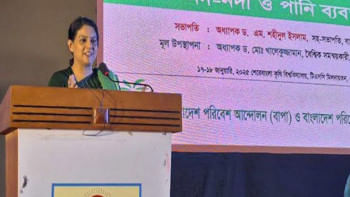Form commission to tackle environmental issues: Rehman Sobhan

Former caretaker government adviser Professor Rehman Sobhan has attributed environmental degradation to unchecked profit motives and market dominance, urging the establishment of a dedicated commission to tackle these challenges.
"Environmental protection efforts are being hindered for the lack of proper enforcement of laws... I also called for urgent action to establish a commission dedicated to addressing environmental challenges," he said while inaugurating a special conference celebrating the 25th anniversary of Bangladesh Poribesh Andolon (BAPA) at the Sher-e-Bangla Agricultural University in Dhaka today.
Rehman Sobhan underscored the need for collective action and suggested forming a specialised commission to address the issue effectively.
BAPA President Dr Nur Mohammad Talukdar chaired the inaugural session, while Professor Dr Nazrul Islam, BEN founder and BAPA Vice-President, presented the keynote paper.
Other notable speakers included Sher-e-Bangla Agricultural University Vice-Chancellor Professor Dr Md Abdul Latif, BEN Global Coordinator Professor Dr Md Khalequzzaman, BAPA Vice-President Dr Mostafizur Rahman, Professor Dr Md Shahidul Islam, Khushi Kabir, BAPA General Secretary Alamgir Kabir, Treasurer Zakir Hossain, and Joint Secretary Dr Ahmed Kamruzzaman Majumder.
Prof Rehman highlighted how the rising cost of land, driven by market economics, is leading to the encroachment of rivers, wetlands, and forests for housing development.
While acknowledging some initiatives already undertaken by the Ministry of Environment, he called for urgent action to establish a commission dedicated to addressing environmental challenges.
Praising the involvement of citizens in environmental movements, Sobhan noted that despite existing progressive laws, their implementation remains inadequate.
Pointing to the influence of unaccounted-for wealth as a contributing factor, he stressed the importance of unifying disparate environmental platforms to create collective pressure on the government.
Drawing attention to past development projects, he said the Kaptai Hydropower Project, initially envisioned as a solution to the country's energy crisis, failed to deliver on its promises.
"Instead, it displaced a significant population and caused severe environmental damage. We must refrain from pursuing projects that harm the environment," he asserted.
In his keynote speech, Professor Nazrul Islam lauded BAPA and BEN for building a substantial repository of knowledge on environmental issues over the past 25 years.
He questioned whether any organisation, including the government, possesses comparable data, analysis, and recommendations.
Nazrul Islam, however, acknowledged the challenges of sustaining voluntary efforts and self-funded initiatives, calling for increased collaborative support.
BAPA President Dr Nur Mohammad Talukdar reflected on the organisation's achievements over its 25-year journey while noting gaps in creating a nationwide environmental movement.
He stressed the need to connect with grassroots communities affected by local environmental problems, many of whom remain unaware of BAPA's initiatives.
Following the inaugural session, the conference proceeded with working sessions. The first session discussed "BAPA and Environmental Struggles: A Political Perspective," the second focused on "Rivers and Water Management," and the third addressed "Air, Noise, Visual Pollution, and Waste Management."
Environmental scientists, researchers and representatives from across the country attended the conference and shared insights and proposed solutions to the pressing environmental issues.


 For all latest news, follow The Daily Star's Google News channel.
For all latest news, follow The Daily Star's Google News channel. 



Comments